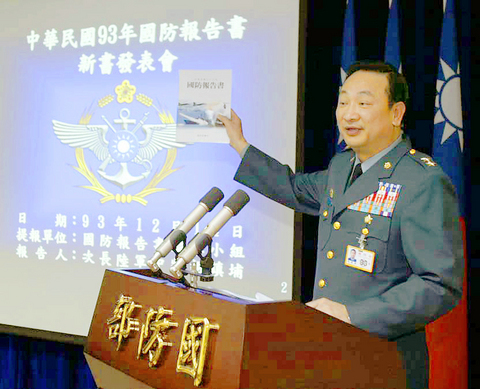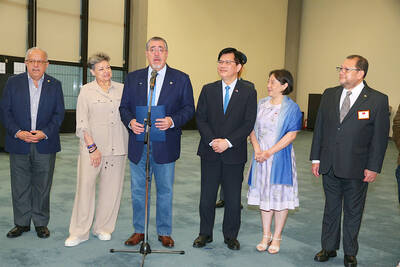The people of Taiwan support the procurement of three major weapons systems from the US, according to the military's top political warfare officer, and it is important to understand that the issue is not a question of politics, but of defense.
In a recent interview with the Taipei Times, the head of Taiwan's political warfare department, General Hu Chen-pu (胡鎮埔), spoke at length about the stymied arms procurement from the US.
Originally, a special budget that would have allowed Taiwan to purchase three major weapons systems from the US -- including 12 P-3C Orion maritime patrol aircraft, three PAC-3 Patriot anti-missile batteries and eight diesel-electric submarines was proposed by the government last year. The special budget has languished in the Legislative Yuan ever since, due to opposition from the pan-blue alliance, which holds a legislative majority.

PHOTO COURTESY OF MND
The MND even removed the Patriot missiles from the special budget, seen as a major concession to critics of the bill, and included them in the annual defense budget.
Hu served as the liaison between the MND and the legislature, and headed the ministry's efforts to gain support for the procurement among legislators. He has now spearheaded the ministry's efforts to explain the details of the arms procurement to the public.
One of the major criticisms of the plan has been the cost of the submarines, which some lawmakers have described as "excessive." Hu said, this is not the case.
"Of course, many people do not understand the complexities of the arms procurement process in Taiwan," Hu said. "Due to the nature of the arms trade, it is important that a budget for procurement is available before production begins. Therefore, the price for this procurement is not the final price, as there has to be a degree of flexibility."
Since the MND has decided to pay for the PAC-3 anti-missile batteries using the military's annual budget, many experts have claimed that this will have an impact on other programs that the military is pursuing. Hu was more specific.
"If the cost of the items on the special budget is included in the annual budget, it will prevent Taiwan from buying any other new weapons systems for 10 years," the general said. "If two-thirds of the cost were included, it would mean that we could not pursue new systems for 8 years."
"As it is, with the PAC-3s included in the annual budget, 109 major military procurement projects will be affected," he said.
But although a lot of people have focused on the three items in the special budget, the political stalemate in the legislature has left the military with more woes than many people imagine.
"For next year, there are 65 items that the military is trying to acquire. Of these, we have had to delay 53," Hu said. "This is why it was very exciting to hear the president say that the defense budget would be increased to 3 percent of the GDP [Ed.'s note: the nation's defense budget for this year stands at approximately 2.4 percent of the GDP, around US$8 billion]. If the budget hits 3 percent, it will solve many of the military's problems."
The general also pointed out that, aside from the issue of arms procurement, the military had made positive steps in other areas, such as in preparing Kidd-class destroyers for delivery from the US.
"[US Marine Brigadier General] John Allen [the Department of Defense's director for Asian and Pacific Affairs] got a very good impression of Taiwan's navy because of the Kidd program. He was surprised by the quality of our logistics," Hu said.
The military was still taking the long view with regards to procurement activities.
"Actually, every country has well-established procurement plans with a long-term view," Hu said. "We are still examining the procurement of next-generation fighter aircraft, minesweeping helicopters, assault helicopters and eight-wheeled armored vehicles for the future."
"In any case, I hope that people can understand that, for the military, procurement is entirely a professional question. Unfortunately, it is now difficult for us to discuss these issues due to the politicized environment, and the partisan efforts to use the military to promote a political agenda," Hu said.
Indeed, most people were behind the military's procurement efforts, the general said, citing a recent poll by ERA television station.
"Seventy percent of respondents [in the poll] wanted the special budget to move forward to the National Defense Committee for review," he said. "And 50 percent supported the purchase of the items outright."

Greenpeace yesterday said that it is to appeal a decision last month by the Taipei High Administrative Court to dismiss its 2021 lawsuit against the Ministry of Economic Affairs over “loose” regulations governing major corporate electricity consumers. The climate-related lawsuit — the first of its kind in Taiwan — sought to require the government to enforce higher green energy thresholds on major corporations to reduce emissions in light of climate change and an uptick in extreme weather. The suit, filed by Greenpeace East Asia, the Environmental Jurists Association and four individual plaintiffs, was dismissed on May 8 following four years of litigation. The

A former officer in China’s People’s Liberation Army (PLA) who witnessed the aftermath of the 1989 Tiananmen Square massacre has warned that Taiwan could face a similar fate if China attempts to unify the country by force. Li Xiaoming (李曉明), who was deployed to Beijing as a junior officer during the crackdown, said Taiwanese people should study the massacre carefully, because it offers a glimpse of what Beijing is willing to do to suppress dissent. “What happened in Tiananmen Square could happen in Taiwan too,” Li told CNA in a May 22 interview, ahead of the massacre’s 36th anniversary. “If Taiwanese students or

DIPLOMACY: It is Guatemalan President Bernardo Arevalo’s first visit to Taiwan since he took office last year, while Eswatini’s foreign minister is also paying a visit A delegation led by Guatemalan President Bernardo Arevalo arrived in Taiwan yesterday afternoon and is to visit President William Lai (賴清德) today. The delegation arrived at Taiwan Taoyuan International Airport at 4:55pm, and was greeted by Minister of Foreign Affairs Lin Chia-lung (林佳龍). It is Arevalo’s first trip to Taiwan since he took office last year, and following the visit, he is to travel to Japan to celebrate the 90th anniversary of diplomatic relations between the two countries. Arevalo said at the airport that he is very glad to make the visit to Taiwan, adding that he brings an important message of responsibility

STAY AWAY: An official said people should avoid disturbing snakes, as most do not actively attack humans, but would react defensively if threatened Taitung County authorities yesterday urged the public to stay vigilant and avoid disturbing snakes in the wild, following five reported snakebite cases in the county so far this year. Taitung County Fire Department secretary Lin Chien-cheng (林建誠) said two of the cases were in Donghe Township (東河) and involved the Taiwan habus, one person was bit by a Chinese pit viper near the South Link Railway and the remaining two were caused by unidentified snakes. He advised residents near fields to be cautious of snakes hiding in shady indoor areas, especially when entering or leaving their homes at night. In case of a